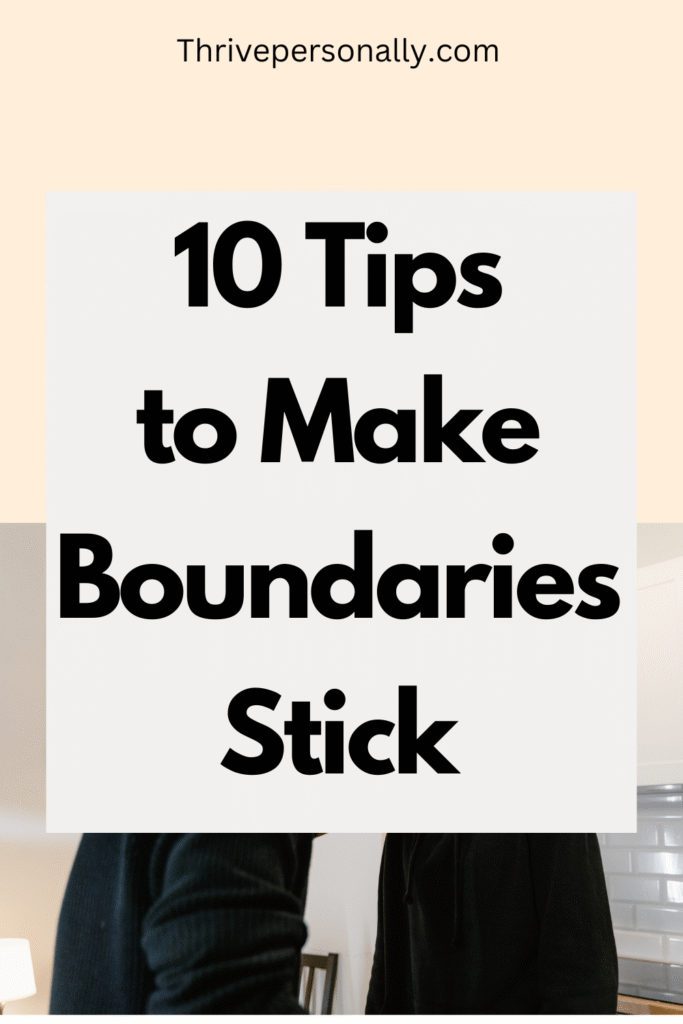Setting boundaries is a crucial aspect of maintaining healthy relationships and personal well-being. Boundaries define what behaviors are acceptable an
Boundaries are not about building walls between you and others. They’re about protecting your peace, your time, your energy, and your emotional space. Good boundaries help you feel safe and respected in your relationships, your work, and your everyday life. They tell people how to treat you. More importantly, they remind you how to treat yourself.
Without boundaries, you may say yes when you want to say no. You may stay quiet when you need to speak up. You may stretch yourself thin trying to make everyone else comfortable. That’s not kindness. That’s self-neglect. And the longer you live that way, the more drained and resentful you become.
Setting boundaries is a skill. It’s something you learn and practice—not something you’re born knowing how to do. You start by understanding what matters to you. You grow by getting clear about what you can and cannot accept. And with time, your boundaries stop feeling scary. They start feeling like self-respect.
Ten simple tips for making boundaries
1. Get Clear on What Bothers You
The first step in making a boundary is noticing what doesn’t feel right. Pay attention to the moments when you feel used, drained, uncomfortable, or overlooked. These feelings are signals. Your body and emotions are telling you that something needs to change.
Maybe you feel annoyed when someone texts you late at night. Maybe you feel anxious when a friend expects too much from you. Maybe your boss constantly gives you extra work without asking. These are moments where a boundary might be missing.
Don’t rush to fix it. Just start by noticing it. When you know what bothers you, it becomes easier to name the need behind it. That’s the root of any strong boundary.
Read also: 10 Reasons Why Boundaries Are the Real Love Language
2. Decide What You’re Willing to Accept
Boundaries are not about changing other people. They’re about deciding what you’re okay with and what you’re not. Once you know what bothers you, ask yourself: What feels okay? What crosses the line?
You might say, “I’m okay with helping sometimes, but not when I’m already overwhelmed.” Or, “I’m fine with having a conversation, but not if someone’s yelling at me.” These choices belong to you. You don’t need permission to set them. You just need clarity.
According to Mental Health America, boundaries protect your emotional energy and mental health. When you know your limits, you stop trying to please everyone. You start honoring yourself.
Read also: 6 Reasons Why Setting Boundaries is Important in Your Relationships
3. Say It Simply and Calmly
You don’t need long speeches or deep explanations to set a boundary. In fact, the clearer and simpler your words are, the better. If someone is crossing your line, say what you need without overexplaining.
Try things like: “I’m not available after 8 p.m.” or “I don’t feel comfortable with that” or “Please don’t speak to me like that.” Keep your tone steady. You’re not asking for approval—you’re stating your need.
When you set a boundary, some people might push back. That doesn’t mean you’re wrong. It means they were used to your silence. Hold your ground. Speak with respect, but speak firmly.
Read also: 45 Confidence-Building Journaling Prompts
4. Practice Saying No Without Feeling Guilty
Saying no is one of the hardest—and most important—parts of building boundaries. If you were taught that saying no is rude or selfish, it might feel uncomfortable at first. But saying no doesn’t mean you don’t care. It means you care about yourself, too.
No is a complete sentence. You don’t have to justify it with a long story. You can say, “No, I can’t,” or “No, not this time,” and leave it there. The more you practice, the easier it becomes.
According to Psychology Today, learning to say no helps reduce stress, anxiety, and resentment. It keeps you from overcommitting and protects your energy for the things that really matter.
5. Use “I” Statements to Express Yourself
When you need to talk about a boundary, speak from your own experience instead of blaming the other person. This keeps the conversation more calm and respectful. It also helps the other person listen without getting defensive.
Start your sentence with “I” instead of “you.” For example: “I feel overwhelmed when plans change last minute” instead of “You always cancel.” Or “I need more space during the day” instead of “You’re too needy.”
These small shifts in language make a big difference. They help you take ownership of your needs while still keeping the door open for healthy communication.
6. Follow Through with Consequences
A boundary without follow-through is just a suggestion. If you say you’re not okay with something, but you allow it anyway, people stop taking your words seriously. To protect your peace, you need to stick to what you say.
This doesn’t mean being harsh or cold. It just means being clear. If someone keeps crossing your line, let them know what will happen next—and follow through. Maybe you leave the conversation. Maybe you take a break from that relationship. Maybe you limit how much time you spend with that person.
You teach people how to treat you by what you allow. When you hold your boundary, even when it’s hard, you teach yourself that your needs matter.
7. Expect Some Pushback—and Don’t Take It Personally
Some people won’t like your boundaries. Especially if they were used to you always saying yes, always agreeing, or always being available. When you change the rules, they may react with confusion, anger, or guilt-tripping.
This is normal. It doesn’t mean you’re doing something wrong. It means you’re changing the dynamic. And while that can feel uncomfortable, it’s a sign that you’re growing.
Their reaction is not your responsibility. Your job is to stay honest, kind, and clear. Over time, healthy people will adjust. Others may fall away—and that’s okay, too.
8. Make Boundaries Part of Daily Life
You don’t have to wait for a crisis to set a boundary. In fact, the best time to build them is during the quiet moments of life. Boundaries aren’t just for big situations—they’re also for the small choices you make every day.
You set a boundary when you choose not to check your phone after a certain hour. You set one when you turn down an invitation because you’re tired. You set one when you ask for space or time alone.
These small boundaries build the foundation of your well-being. The more you practice them, the more natural they become.
9. Revisit and Adjust When Needed
Boundaries are not fixed forever. As you grow and change, so do your needs. A boundary that worked last year may not work today. That’s normal. Life changes. Relationships shift. And you always have permission to update your boundaries to fit your current reality.
If a certain line starts to feel too tight or too loose, pause and ask yourself: What do I need now? How can I honor that? Adjust your words and actions to reflect that change. The most important part is staying honest with yourself.
As Verywell Mind explains, healthy boundaries improve mental health and help maintain strong, balanced relationships. But like any part of mental health, they need checking in on and refreshing when necessary.
10. Be Patient with Yourself
Setting boundaries can feel awkward at first. You might stumble over your words. You might feel guilt. You might worry that you’re being too much or not enough. That’s okay. Growth feels messy sometimes.
The key is not to give up. Every time you speak up for yourself, you’re practicing a skill that makes you stronger. Confidence doesn’t mean never feeling doubt. It means moving forward even when the doubt is there.
Give yourself grace. You’re learning to care for yourself in a deeper way. That takes courage. That takes love. And that’s something to be proud of.
Final Thoughts
At the heart of every boundary is self-love. It’s a quiet voice inside you saying, “I matter. My time matters. My energy matters. My peace matters.” When you live without boundaries, that voice gets quieter. But when you start setting boundaries, that voice grows louder—and so does your strength.
Boundaries don’t push people away. They help you stay close to the right ones and safe from the wrong ones. They help you show up fully without burning out. They help you live with more honesty and less resentment.
Start small. Speak simply. Trust your feelings. And remember, boundaries are not selfish. They are necessary. They are kind. And they are how you protect the most important relationship of all—the one you have with yourself.
Save the pin for later


